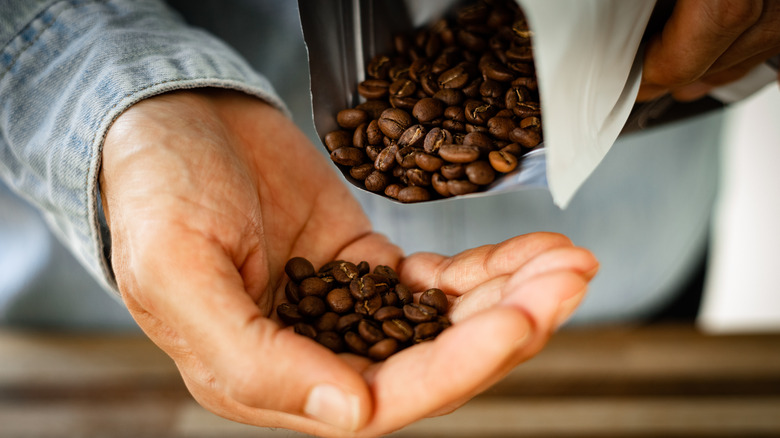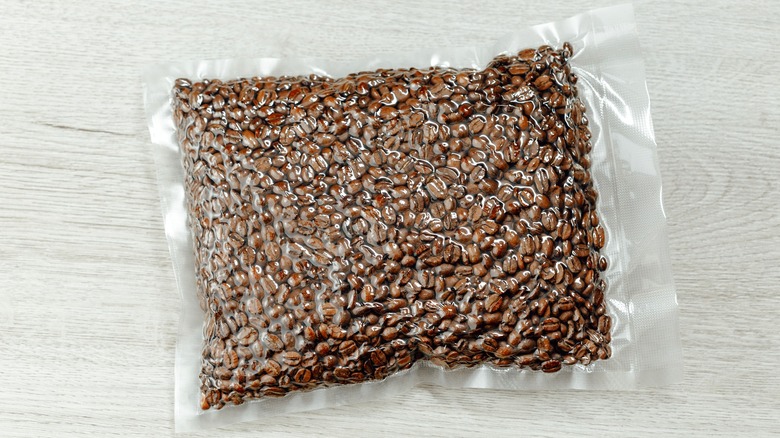Yes, You Can Freeze Coffee Beans To Keep Them Fresh
If you're the type that doesn't like to start their day without a cup of joe, you might be tempted to stock up on coffee beans. Whether you just like to know you're not going to run out or you found a particular favorite that you want to save and savor, you might find yourself wanting to keep those coffee beans past their recommended shelf life.
Coffee beans don't last forever, even when they're sealed or stored properly in a cool, dark place. Exposure to air will start to degrade your coffee, as aromas escape and a process called oxidation begins. During this process, the oils in coffee start to break down and become rancid, turning those delicious flavors into something bitter.
The good news is that you can definitely put a stop to these processes by freezing your coffee beans. If this advice runs contrary to what you've been told previously, we're going to debunk those old myths and tell you why freezing is not the enemy of freshness. Successfully freezing your coffee beans takes a few steps to ensure that it's done properly, but don't worry. It's pretty straightforward, and worth it in the long run.
Different types of coffee beans will freeze differently
If you're planning on freezing your coffee beans, there are a few things to keep in mind — starting with the fact that not all types of coffee beans will freeze the same way. If you're choosing coffee beans specifically to freeze, you might want to consider reaching for the lighter roasts.
This is because lightly roasted coffee beans tend to result in more delicately-flavored coffees, and those mild flavors will be well preserved during the freezing process. However, dark roasts tend to be more complex, richer, and stronger. While you certainly can freeze dark roast beans, if you're valuing them for a depth of flavor, you should know that there's a good chance they're going to lose some of that complex boldness. After the beans are frozen, the coffee made from them will still be fine to drink, it just won't be as rich.
Additionally, higher quality beans will retain their flavor better. So the better the beans, the better they are for freezing. If you've ever wanted to treat yourself to a really expensive or rare bag of coffee for a special occasion, you absolutely can — and, you can freeze some of the beans to savor it for the next year.
Air-tight packaging is key when freezing coffee beans
When you freeze coffee beans, you're preserving them for future use, of course. But there's some fascinating science going on here, and it works because of two factors. First, freezing stops bacterial growth which can destroy the beans. Second, the process eliminates the beans' exposure to air, which is why it's so important to freeze your coffee in airtight containers.
The very best way to freeze coffee is with a vacuum sealer, which is a reasonably affordable kitchen gadget that, once you buy it, you might find yourself using it for all kinds of preservation purposes. Ideally, you should portion out a few days' worth of coffee into a bag, vacuum seal it, and put it in the freezer. When you're ready to thaw and use some, it will be easy! Just put a bag in the fridge and let it thaw gradually. This last step will prevent moisture from escaping too quickly, ruining the quality of your beans and potentially leading to bacterial growth.
While you can certainly freeze an entire commercially-sealed bag of beans, things are going to get tricky when you thaw it. Any moisture that's in the bag can damage your beans if you attempt to refreeze it. Since it's so easy to do it right and vacuum-seal the bag, why take the risk?


